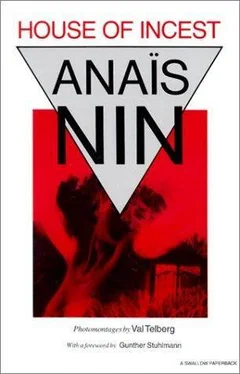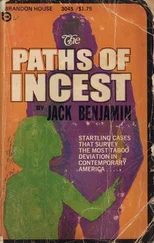Anaïs Nin
HOUSE OF INCEST
ALL THAT I KNOW IS CONTAINED IN THIS BOOK WRITTEN WITHOUT WITNESS, AN EDIFICE WITHOUT DIMENSION, A CITY HANGING IN THE SKY.
The morning I got up to begin this book I coughed. Something was coming out of my throat: it was strangling me. I broke the thread which held it and yanked it out. I went back to bed and said: I have just spat out my heart.
There is an instrument called the quena made of human bones. It owes its origin to the worship of an Indian for his mistress. When she died he made a flute out of her bones. The quena has a more penetrating, more haunting sound than the ordinary flute.
Those who write know the process. I thought of it as I was spitting out my heart.
Only I do not wait for my love to die.

My first vision of earth was water veiled. I am of the race of men and women who see all things through this curtain of sea, and my eyes are the color of water.
I looked with chameleon eyes upon the changing face of the world, looked with anonymous vision upon my uncompleted self.
I remember my first birth in water. All round me a sulphurous transparency and my bones move as if made of rubber. I sway and float, stand on boneless toes listening for distant sounds, sounds beyond the reach of human ears, see things beyond the reach of human eyes. Born full of memories of the bells of the Atlantide.
Always listening for lost sounds and searching for lost colors, standing forever on the threshold like one troubled with memories, and walking with a swimming stride. I cut the air with wide-slicing fins, and swim through wall-less rooms.
Ejecfrom a paradise of soundlessness, cathedrals wavering at the passage of a body, like soundless music.
This Atlantide could be found again only at night, by the route of the dream. As soon as sleep covered the rigid new city, the rigidity of the new world, the heaviest portals slid open on smooth-oiled gongs and one entered the voicelessness of the dream. The terror and joy of murders accomplished in silence, in the silence of slidings and brushings. The blanket of water lying over all things stifling the voice. Only a monster brought me up on the surface by accident.
Lost in the colors of the Atlantide, the colors running into one another without frontiers. Fishes made of velvet, of organdie with lace fangs, made of spangled taffeta, of silks and feathers and whiskers, with lacquered flanks and rock crystal eyes, fishes of withered leather with gooseberry eyes, eyes like the white of egg. Flowers palpitating on stalks like sea-hearts. None of them feeling their own weight, the sea-horse moving like a feather…
It was like yawning. I loved the ease and the blindness and the suave voyages on the water bearing one through obstacles. The water was there to bear one like a giant bosom; there was always the water to rest on, and the water transmitted the lives and the loves, the words and the thoughts.
Far beneath the level of storms I slept. I moved within color and music as inside a sea-diamond. There were no currents of thoughts, only the caress of flow and desire mingling, touching, traveling, withdrawing, wandering—the endless bottoms of peace.
I do not remember being cold there, nor warm. No pain of cold and heat. The temperature of sleep, feverless and chilless. I do not remember being hungry. Food seeped through invisible pores. I do not remember weeping.
I felt only the caress of moving—moving into the body of another—absorbed and lost within the flesh of another lulled by the rhythm of water, the slow palpitation of the senses, the movement of silk.
Loving without knowingness, moving without effort, in the soft current of water and desire, breathing in an ecstasy of dissolution.
I awoke at dawn, thrown up on a rock, the skeleton of a ship choked in its own sails.
The night surrounded me, a photograph unglued from its frame. The lining of a coat ripped open like the two shells of an oyster. The day and night unglued, and I falling in between not knowing on which layer I was resting, whether it was the cold grey upper leaf of dawn, or the dark layer of night.
Sabina’s face was suspended in the darkness of the garden. From the eyes a simoun wind shriveled the leaves and turned the earth over; all things which had run a vertical course now turned in circles, round the face, around HER face. She stared with such an ancient stare, heavy luxuriant centuries flickering in deep processions. From her nacreous skin perfumes spiraled like incense. Every gesture she made quickened the rhythm of the blood and aroused a beat chant like the beat of the heart of the desert, a chant which was the sound of her feet treading down into the blood the imprint of . The tee.
A voice that had traversed the centuries, so heavy it broke what it touched, so heavy I feared it would ring in me with eternal resonance; a voice rusty with the sound of curses and the hoarse cries that issue from the delta in the last paroxysm of orgasm.
Her black cape hung like black hair from her shoulders, half-draped, half-floating around her body. The web of her dress moving always a moment before she moved, as if aware of her impulses, and stirring long after she was still, like waves ebbing back to the sea. Her sleeves dropped like a sigh and the hem of her dress danced round her feet.
The steel necklace on her throat flashed like summer lightning and the sound of the steel was like the clashing of swords… Le pas d’acier… The steel of New York’s skeleton buried in granite, buried standing up. Le pas d’acier… notes hammered on the steel-stringed guitars of the gypsies, on the steel arms of chairs dulled with her breath; steel mail curtains falling like the flail of hail, steel bars and steel barrage cracking. Her necklace thrown around the world’s neck, unmeltable. She carried it like a trophy wrung of groaning machinery, to match the inhuman rhythm of her march.
The leaf fall of her words, the stained glass hues of her moods, the rust in her voice, the smoke in her mouth, her breath on my vision like human breath blinding a mirror.
Talk—half-talk, phrases that had no need to be finished, abstractions, Chinese bells played on with cotton-tipped sticks, mock orange blossoms painted on porcelain. The muffled, close, half-talk of soft-fleshed women. The men she had embraced, and the women, all washing against the resonance of my memory. Sound within sound, scene within scene, woman within woman—like acid revealing an invisible script. One woman within another eternally, in a far-reaching procession, shattering my mind into fragments, into quarter tones which no orchestral baton can ever make whole again.
The luminous mask of her face, waxy, immobile, with eyes like sentinels. Watching my sybaritic walk, and I the sibilance of her tongue. Deep into each other we turned our harlot eyes. She was an idol in Byzance, an idol dancing with legs parted; and I wrote with pollen and honey. The soft secret yielding of woman I carved into men’s brains with copper words; her image I tattooed in their eyes. They were consumed by the fever of their entrails, the indissoluble poison of legends. If the torrent failed to engulf them, or did they extricate themselves, I haunted their memory with the tale they wished to forget. All that was swift and malevolent in woman might be ruthlessly destroyed, but who would destroy the illusion on which I laid her to sleep each night? We lived in Byzance. Sabina and I, until our hearts bled from the precious stones on our foreheads, our bodies tired of the weight of brocades, our nostrils burned with the smoke of perfumes; and when we had passed into other centuries they enclosed us in copper frames. Men recognized her always: the same effulgent face, the same rust voice. And she and I, we recognized each other; I her face and she my legend.
Читать дальше














